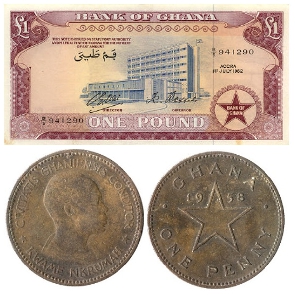Ghana hasn’t always had the Cedi as its legal tender – currency. As a colony of the British whose currency is the British Pounds, the country had to be given a currency in line.
In the 50s countries under the British Colony were using the British West African Pound which was the currency of the British colonies in the region.
According to the Bank of Ghana, during this period, the West African Currency Board (WACB) was in charge of issuing currencies including the West African Pound, Shillings, and Pence.
But in 1958, a year after Dr. Kwame Nkrumah gained independence for Ghana, the country began using the Ghanaian Pound.
This came both in paper form and in coins. The paper denominations had 10/–, £1 and £5. The £1 and £5 notes were produced until 1962 when they were phased out of the system.
However, the 10/– note was produced until 1963.
Bronze coins which were also used side by side the notes were issued for 1⁄2d and 1d, along with cupro-nickel 3d and 6d, 1/– and 2/–. The 3d coin was scalloped in shape.
8 years after, on the 19th of September 1965, the Ghana Pound was phased out throughout the country and replaced by the Cedi.
Dr. Nkrumah decided to move away from the British colonial monetary system and adopt the widely accepted decimal system.
Until the 17th of September, 1966 however, both currencies – Pound and Cedi were being used side by side until the eventual ceasure of the Pound as a legal tender in Ghana.
Derived from the Akan word “sedie” which means cowries, the Cedi notes were introduced on 19th July 1965. The Pesewa whose name was derived from the British Penny also was introduced and these currencies replaced the previous Ghana pounds, shillings and pence.
The “Pesewa” represented the smallest denomination (quantity) of the gold-dust currency regime.
WA
Business News of Sunday, 5 February 2023
Source: www.ghanaweb.com













